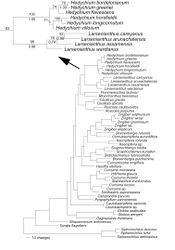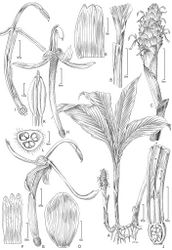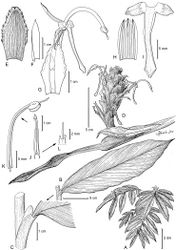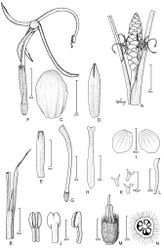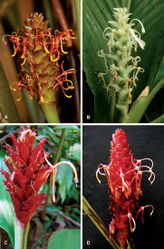Larsenianthus
| Notice: | This page is derived from the original publication listed below, whose author(s) should always be credited. Further contributors may edit and improve the content of this page and, consequently, need to be credited as well (see page history). Any assessment of factual correctness requires a careful review of the original article as well as of subsequent contributions.
If you are uncertain whether your planned contribution is correct or not, we suggest that you use the associated discussion page instead of editing the page directly. This page should be cited as follows (rationale):
Citation formats to copy and paste
BibTeX: @article{Kress2010PhytoKeys1, RIS/ Endnote: TY - JOUR Wikipedia/ Citizendium: <ref name="Kress2010PhytoKeys1">{{Citation See also the citation download page at the journal. |
Name
Larsenianthus W. J. Kress & Mood gen. nov. – Wikispecies link – IPNI link – Pensoft Profile
Latin
Zingiberacearum tribus Zingiberearum genus novum Hedychio J. Koenig affine, a quo staminodiis lateralibus parvis auriculatis, labello angusto elongato marginibus incrassatis carinaque centrali et filamento valde arcuato differt.
Type
Larsenianthus careyanus (Benth.) W. J. Kress & Mood, comb. nov., Hitchenia careyana Benth., Gen. Pl. 3: 643. 1883.
Description
Evergreen, rhizomatous, terrestrial herbs, clumping with 10–20 shoots per plant, 1–2.5 m tall, plane of distichy of leaves parallel to rhizome, 2–12 leaves per shoot, alternate, sessile to petiolate. Inflorescence terminal on leafy shoot or basal on leafless shoot, pedunculate; bracts basally attached, reflexed or adpressed, spirally arranged and imbricate, 35–80 per inflorescence, not pouched, adventitious plantlets sometimes produced in sterile bracts at base of inflorescence; flowers mature from base to apex of inflorescence. Bracteoles variable in size, the inner one largest, not tubular. Flowers conspicuous, in cincinni of 2–6 flowers or rarely reduced to one flower; calyx tubular, tri-dentate, shorter than the corolla; floral tube long and curved, exserted well beyond the bract, corolla lobes subequal with dorsal lobe slightly larger than laterals, apex opening oblong, bordered on the two lateral sides with a thickened and rounded margin formed by the base of the lateral staminodes and the labellum; lateral staminodes small, bowl-shaped, reflexed; labellum narrow at the base, widening towards the apex, elongate, oblanceolate or spatulate, basal margins thickened, raised with center channeled or ‘v’ in cross-section, apex dentate or entire; fertile stamen long and arched over the labellum, anther oblong, without a crest, thecae dehiscent for full length; epigynous glands linear; style with stigma protruding beyond anther thecae; ovary trilocular, fruit an oblong capsule, two-layered with the outer splitting into three coiled sections, the inner forming an arillate membrane covering the 1–10 seeds.
Discussion
Larsenianthus is a distinctive genus in the tribe Zingibereae. Some similarities exist with the genera Hedychium, Globba and Pommereschea in the vegetative parts, the bract orientation, and the long filament. The uniqueness of the genus and its close relationship to Hedychium is confirmed by phylogenetic analyses of DNA sequence data (Fig. 1). However, the combination of unique features including the narrow, elongate labellum with slightly thicken edges and a deeply channeled center combined with the small, cup-shaped lateral staminodes and strongly arched filament clearly distinguish this genus from others in the tribe. Two additional traits that characterize at least two of the four species in the genus (Larsenianthus assamensis and Larsenianthus careyanus) are the unusual white capsular fruit with a gelatinous fused arillate structure that encases the seeds and the multiple adventitious plantlets that form in the axils of the sterile bracts at the base of the inflorescence.
Etymology
This new genus honors Dr. Kai Larsen, Professor of Botany Emeritus, Aarhus University, Denmark, for his many years of dedicated efforts in the education of botanists worldwide and for his profound achievements in the taxonomy of the family Zingiberaceae, especially in the flora of Thailand.
Key to species of Larsenianthus
Original Description
- Kress, W; D. Mood, J; Sabu, M; Prince, L; Dey, S; Sanoj, E; 2010: Larsenianthus, a new Asian genus of Gingers (Zingiberaceae) with four species PhytoKeys, 1: 15-32. doi
Images
|
